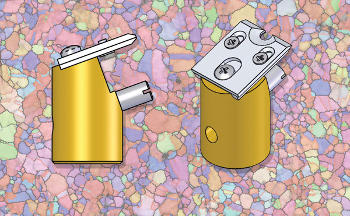Oxford Instruments has introduced a sample holder specifically designed for TKD analysis.
TKD, Transmission Kikuchi Diffraction analysis, is a relatively new microanalysis technique that is used to characterise grains that are typically only tens of nanometres wide – a fraction of the size that traditional EBSD can address.

TKD uses conventional EBSD hardware and software, but the samples are thin and electron transparent. As the diffraction signal is obtained from a few to tens of nanometres above the bottom of the sample surface, the technique is sometimes referred to as transmission EBSD (t-EBSD). Sample preparation is important, as is being able to mount it in the correct position inside the SEM. The sample is typically mounted above the top of the EBSD screen, typically at a short working distance.
EBSD Business manager, Dr. Jenny Goulden, stated, “This new sample holder is designed for easy mounting and positioning of the thin sample. Once mounted, the user uses the standard AZtec EBSD system to acquire and analyse the results.”
About Oxford Instruments plc
Oxford Instruments designs, supplies and supports high-technology tools and systems with a focus on research and industrial applications. It provides solutions needed to advance fundamental physics research and its transfer into commercial nanotechnology applications. Innovation has been the driving force behind Oxford Instruments' growth and success for over 50 years, and its strategy is to effect the successful commercialisation of these ideas by bringing them to market in a timely and customer-focused fashion.
The first technology business to be spun out from Oxford University over fifty years ago, Oxford Instruments is now a global company with over 1900 staff worldwide and is listed on the FTSE250 index of the London Stock Exchange (OXIG). Its objective is to be the leading provider of new generation tools and systems for the research and industrial sectors.
This involves the combination of core technologies in areas such as low temperature, high magnetic field and ultra high vacuum environments, Nuclear Magnetic Resonance, X-ray, electron and optical based metrology, and advanced growth, deposition and etching.
Oxford Instruments aims to pursue responsible development and deeper understanding of our world through science and technology. Its products, expertise, and ideas address global issues such as energy, environment, security and health.
About Oxford Instruments NanoAnalysis
Oxford Instruments NanoAnalysis provides leading-edge tools that enable materials characterisation and sample manipulation at the nanometre scale. Used on electron microscopes and ion-beam systems, our tools are used for R&D across a wide range of academic and industrial applications including semiconductors, renewable energy, mining, metallurgy, and forensics. The division won a Queen’s Award for Enterprise and Innovation in April 2012.